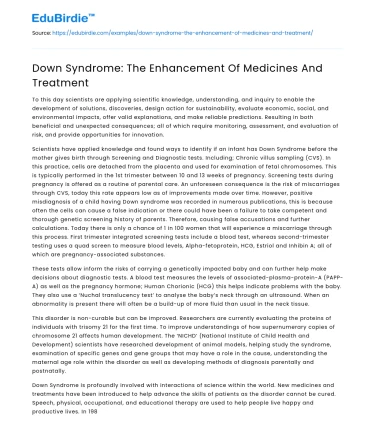To this day scientists are applying scientific knowledge, understanding, and inquiry to enable the development of solutions, discoveries, design action for sustainability, evaluate economic, social, and environmental impacts, offer valid explanations, and make reliable predictions. Resulting in both beneficial and unexpected consequences; all of which require monitoring, assessment, and evaluation of risk, and provide opportunities for innovation.
Scientists have applied knowledge and found ways to identify if an infant has Down Syndrome before the mother gives birth through Screening and Diagnostic tests. Including; Chronic villus sampling (CVS). In this practice, cells are detached from the placenta and used for examination of fetal chromosomes. This is typically performed in the 1st trimester between 10 and 13 weeks of pregnancy. Screening tests during pregnancy is offered as a routine of parental care. An unforeseen consequence is the risk of miscarriages through CVS, today this rate appears low as of improvements made over time. However, positive misdiagnosis of a child having Down syndrome was recorded in numerous publications, this is because often the cells can cause a false indication or there could have been a failure to take competent and thorough genetic screening history of parents. Therefore, causing false accusations and further calculations. Today there is only a chance of 1 in 100 women that will experience a miscarriage through this process. First trimester integrated screening tests include a blood test, whereas second-trimester testing uses a quad screen to measure blood levels, Alpha-fetoprotein, HCG, Estriol and Inhibin A; all of which are pregnancy-associated substances.
Save your time!
We can take care of your essay
- Proper editing and formatting
- Free revision, title page, and bibliography
- Flexible prices and money-back guarantee
These tests allow inform the risks of carrying a genetically impacted baby and can further help make decisions about diagnostic tests. A blood test measures the levels of associated-plasma-protein-A (PAPP-A) as well as the pregnancy hormone; Human Chorionic (HCG) this helps indicate problems with the baby. They also use a ‘Nuchal translucency test’ to analyse the baby’s neck through an ultrasound. When an abnormality is present there will often be a build-up of more fluid than usual in the neck tissue.
This disorder is non-curable but can be improved. Researchers are currently evaluating the proteins of individuals with trisomy 21 for the first time. To improve understandings of how supernumerary copies of chromosome 21 affects human development. The ‘NICHD’ (National Institute of Child Health and Development) scientists have researched development of animal models, helping study the syndrome, examination of specific genes and gene groups that may have a role in the cause, understanding the maternal age role within the disorder as well as developing methods of diagnosis parentally and postnatally.
Down Syndrome is profoundly involved with interactions of science within the world. New medicines and treatments have been introduced to help advance the skills of patients as the disorder cannot be cured. Speech, physical, occupational, and educational therapy are used to help people live happy and productive lives. In 1983 the life expectancy of a person living with Down Syndrome was only 25 years old. Today the average age is 60 years old showing the enhancement of medicines and treatment now provided within modern times. Individuals who have Down Syndrome have become increasingly integrated into society as well as community organisations, such as attending schools, health care systems, workforces as well as social and recreational activities. This Genetic disorder negatively affects the communication of effected people with society.
This disorder has a large influence on the lives affected. People who suffer from severe Down Syndrome require 24/7 care and monitoring to assist them with day to day deeds that others do with ease. It was recorded that the average IQ of a young adult with Down Syndrome is 50, equivalent to the mental ability of an 8–9-year-old. This indicates that it is harder for patients to get a job. Within today’s modern society several prejudice employers are hesitant to employee people suffering from this disorder. The workforce is self-sustaining and would require employers to fund support workers to work alongside these people. Unlike past times there are now places that only cater jobs for people with this syndrome as they have 24/7 providing’s such as ‘Hugs and Mugs café’. A favourable shop; Ikea, is known to go out of their way to hire people with Down Syndrome to incorporate them into the business and provide fulfilling undertakings. Delayed development and behavioural difficulties effect speech and developing of understandings instigating a barrier where children can’t communicate or socially interact; leading to behavioural issues of tantrums and obsessive and compulsive conduct.
Decades ago people with Down Syndrome were institutionalized at birth as society and doctors believed they couldn’t learn nor were they capable to add value to the world. This meant that they weren’t capable to get jobs, join schools or have an education. They have little to no independence and overall were not able to lead a normal life as they weren’t considered ‘normal’. Proving society has evolved to be accommodating and supportive, however, are still seen as less and divided from the public even if people won’t admit it; being a generalised statement based on public opinions. This disorder makes people more susceptible to several other conditions, such as giving birth to children who will have the same disorder, congenital heart disease, cancer, hearing loss, Leukemia, Gastroesophageal reflux, Celiac disease, and dementia. Kids who have the disorder are likely to get infections, effecting lungs and breathing. Kids with Down syndrome tend to develop slower than other children do making it hard for them to ‘fit in’. Common traits include low muscle tone, small stature, slanting eyes, Cognitive delays, heart defects, digestive abnormalities, vision issues and hearing loss, etc; all of which vary and are possessed differently.






 Stuck on your essay?
Stuck on your essay?

